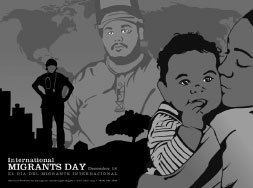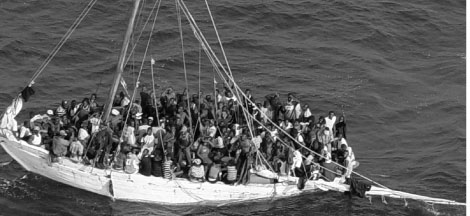|
Yesterday was International Migrants Day:
Migration - essential component of life
By Pramod DE SILVA
 We
are all migrants, in a sense. From ancient times, people have left their
lands in search of other lands. This process of migration has led to the
birth of entire nations. It is a process that continues to this day,
enriching cultures and augmenting diversity. Go to any major city in the
world today and you can hear dozens of languages being spoken. That is
migration at work. We
are all migrants, in a sense. From ancient times, people have left their
lands in search of other lands. This process of migration has led to the
birth of entire nations. It is a process that continues to this day,
enriching cultures and augmenting diversity. Go to any major city in the
world today and you can hear dozens of languages being spoken. That is
migration at work.
Migration is one of the defining issues of the 21st Century. It is
now an essential, inevitable and potentially beneficial component of the
economic and social life of every country and region.
There are around 214 million international migrants, including
refugees, though not counting an estimated 27.1 million people displaced
in their own countries. Migration has become an issue so significant
that the UN has designated a special day for migrants - December 18.
On December 4, 2000, the UN General Assembly, taking into account the
large and increasing number of migrants in the world, proclaimed
December 18 as International Migrants Day. A decade earlier, in 1990,
the Assembly adopted the International Convention on the Protection of
the Rights of All Migrant Workers and Members of Their Families.
Migrants play a fundamental role in strengthening the global economy.
Last year alone, they remitted an estimated US$ 414 billion back to
their home countries. Migrants contribute to economic growth and human
development; they enrich societies through cultural diversity, knowledge
and technology exchange. They also improve demographic balance in ageing
populations.
People migrate due to different reasons - for employment, for
settling down legally through an immigration procedure or asylum or in
some cases, illegally for economic reasons. Whatever the reasons,
migration has become a complex social issue for both migrants’ home
countries and host countries.
As the UN and the International Organisation for Migration (IOM)
note, illegal migration is a major problem. Migration is more likely to
benefit all when it is safe and through regular channels. Yet the
opportunities for regular migration have diminished. In such a scenario,
there is room for human rights violations, xenophobia and exploitation.
Much more needs to be done to safeguard the rights of migrants. The
Global Migration Group - which consists of 14 United Nations agencies,
the International Organization for Migration and the World Bank -
adopted a joint statement in September that underscored the need to
protect the human rights of all migrants.
Limited recourse
Many governments’ immigration policies and protection gaps expose
migrants to abuse, Human Rights Watch (HRW) said in a report in advance
of International Migrants Day.
The abuses include labour exploitation, violence, trafficking,
mistreatment in detention and killings, yet the nations involved offer
limited recourse to seek justice, HRW said. “Many governments make
things worse with policies that aggravate discrimination or make it hard
for migrants to even approach authorities for help.”
In a message to mark this year’s Migrants Day, UN Secretary General
Ban Ki-moon says that labour migrants are more likely to be denied basic
labour protection, due process guarantees, personal security and health
care. They are vulnerable to suffering prolonged detention or
ill-treatment, and in some cases enslavement, rape or even murder. Here
in Sri Lanka, which has nearly 1.5 million workers abroad, such stories
are all too common. From the harrowing tale of Rizana to the horrendous
physical abuse of Ariyawathie, the travails of migrant workers have been
well documented.
The world can take a number of steps to end this situation - all
States should ratify the International Convention on the Protection of
the Rights of All Migrant Workers and Their Families. Individual States
should also have laws to deal with the abuse of migrant workers.
 Despite
the risks, both legal and illegal migration is increasing. If the number
of international migrants continues to grow at the same pace as during
the past 20 years, it could reach 405 million by 2050. One of the
reasons for this steep rise is the significant growth in the labour
force in developing countries from 2.4 billion in 2005 to 3.6 billion in
2040. However, most countries do not have a proper policy or framework
for migration-related issues. “The risk of not putting in place policies
and adequate resources to deal with migration is to lose a historic
opportunity to take advantage of this global phenomenon,” says IOM
Director General William Lacy Swing. Despite
the risks, both legal and illegal migration is increasing. If the number
of international migrants continues to grow at the same pace as during
the past 20 years, it could reach 405 million by 2050. One of the
reasons for this steep rise is the significant growth in the labour
force in developing countries from 2.4 billion in 2005 to 3.6 billion in
2040. However, most countries do not have a proper policy or framework
for migration-related issues. “The risk of not putting in place policies
and adequate resources to deal with migration is to lose a historic
opportunity to take advantage of this global phenomenon,” says IOM
Director General William Lacy Swing.
In fact, the IOM’s 2010 World Migration Report notes emerging
patterns of irregular migration that involve growing numbers of
unaccompanied minors, asylum-seekers, victims of trafficking, or those
seeking to escape the effects of environmental or climate change but for
whom there is currently little international protection. The latter is
likely to become a very serious issue with some low lying islands facing
the prospect of being submerged with a sea level rise. Estimates have
suggested that between 25 million to one billion people could be
displaced by climate change over the next 40 years.
The Migrants Day is relevant to Sri Lanka in the context of the
country’s large migrant population. Most of them are in the Middle East,
but more migrants are heading to ‘new’ countries such as Korea, Italy
and Singapore. Women dominate the migrant population, but more jobs are
being made available for males.
At least another million Sri Lankans have left our shores to reside
permanently in other countries, including the US, UK, Australia, New
Zealand, Canada, Italy and a number of other countries. This includes
both economic and or political asylum seekers and professionals who had
gone through the proper immigration procedures of the respective
countries. Migration for employment is important to Third World
countries because expatriates’ remittances sustain their economies.
Migrants’ remittances are among the top three foreign exchange earners
for Sri Lanka, with nearly US$ 3.3 billion remitted each year.
Illegal channels
Migration for employment has its fair share of problems. Those who go
to various countries primarily through illegal channels have no recourse
to help in case of trouble with their employers. Social problems have
arisen in many households as mothers have left for employment abroad.
There are many instances when fathers have squandered the monies sent to
Sri Lanka, through alcohol or drug abuse and other nefarious activities.
Another major problem is illegal migration either for employment or
for permanent residency. Unfortunately, Sri Lanka has gained notoriety
as a source of illegal migrants, with ships illegally carrying its
nationals being intercepted regularly in international waters. Nearly
all of them are economic immigrants although they cite other reasons
such as persecution.
There are traffickers who demand thousands of dollars per person for
a risky ocean voyage to the West or Australia/New Zealand. Once on those
shores, the illegal immigrants are left to their own devices - and fate.
The traffickers who organise these trips make enormous profits and
disappear with those funds to unknown destinations so that they cannot
be tracked by law enforcement agencies.
 |
|
A vessel carrying
illegal migrants |
There are several factors that propel individuals in developing
countries to undertake these risky sea voyages where hundreds are
crammed into a rickety vessel with little or no margin for safety and
hygiene. One factor is a perceived, often not real, sense of insecurity
in their native countries. Another reason could be the lack of
employment opportunities. Some are just driven by a desire to ‘make it
big’ in the West. It is a pity that the dangers of illegal immigration
are not properly driven home among the youth.
Employment opportunities
One problem that causes legal and illegal migration seems to be the
lack of employment opportunities for certain segments. Sri Lanka does
have one of the lowest unemployment rates in the region, but it is
important that more employment opportunities are created. It would be
beneficial if more opportunities can be created for unskilled persons,
to train them in various vocations for employment in Sri Lanka itself.
It is also prudent to send more skilled workers abroad, instead of
unskilled workers. More avenues must be opened for legal migration, be
it for employment or permanent settlement. For example, the creation of
more legal employment opportunities in countries such as Italy is a
welcome move. The factor of brain drain has to be taken into account,
but the country will still benefit through enhanced remittances.
There should be a dialogue between the developing and developed
worlds over the issue of migration. Affluent countries must re-examine
their border control and immigration policies in view of current
developments. Australia, Canada and New Zealand already have legal
immigration programs mainly targeted at skilled personnel in the
developing world. European and other countries should closely look at
these models and explore the possibility of formulating similar
programs, which will help block or reduce attempts at illegal entry.
Migration is a complex, worldwide phenomenon. It is a never-ending
process. Migrants have the potential to make their home countries
prosper thanks to their remittances. They also make a valuable
contribution to the economies of host nations. They also enhance the
cultural and linguistic diversity of the host countries. But ways and
means must be found to encourage legal migration because illegal
migration results in a myriad of problems. That will take some time and
effort but it is the correct approach to a complex issue.
|

